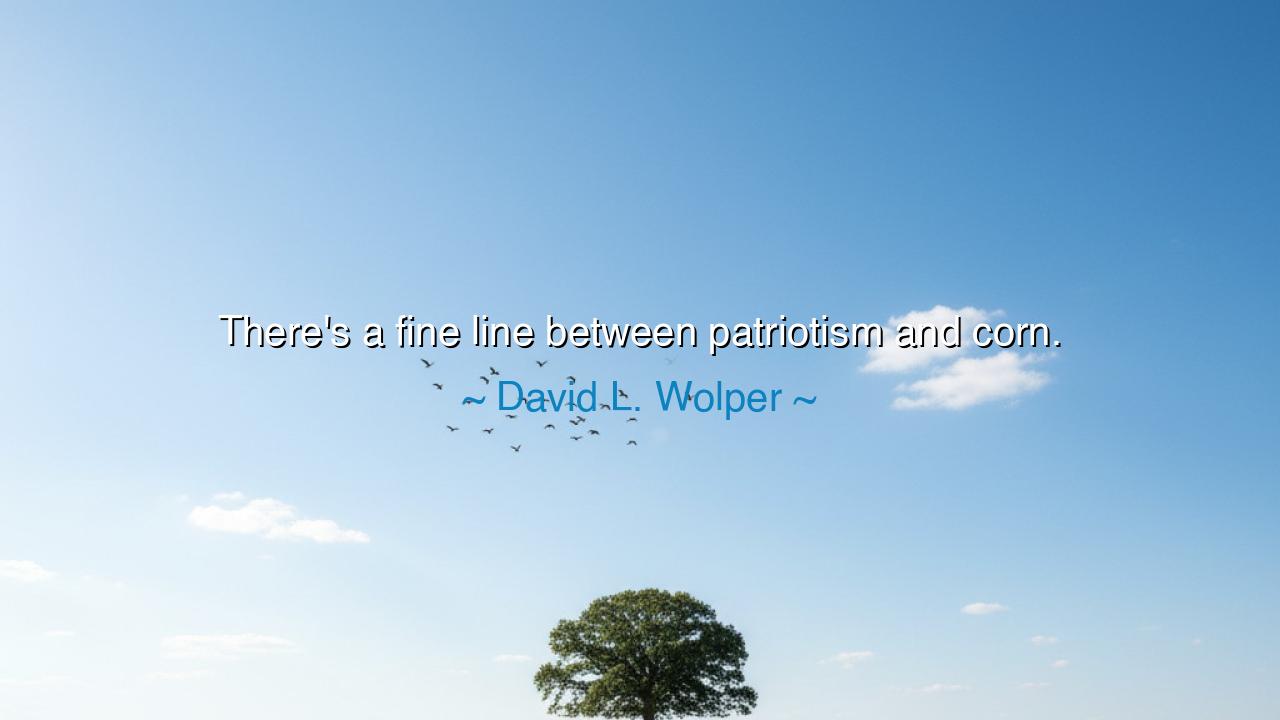
There's a fine line between patriotism and corn.






The words of David L. Wolper—“There’s a fine line between patriotism and corn.”—carry with them both wit and warning. He speaks of the danger when patriotism, noble and fiery, becomes exaggerated into something hollow, sentimental, or theatrical—what he calls “corn.” The metaphor of corn is not of the field, but of the stage: an old word for melodrama, for over-sweetened artifice, for gestures that ring false. In Wolper’s words we are reminded that true devotion to one’s nation is not shown in gaudy displays or empty slogans, but in authenticity, sacrifice, and honest service.
At the heart of this statement lies the recognition that patriotism is fragile. It can easily be transformed into spectacle, where flags are waved not from love, but for applause. Leaders and artists alike can be tempted to turn genuine devotion into a performance— stirring music, fiery speeches, and grand gestures that may touch the surface but fail to touch the soul. Such patriotism becomes “corn”—a parody of itself, too polished, too sentimental, stripped of truth. Wolper, a creator of stories and spectacles, understood how thin the line is between inspiration and manipulation.
History provides us many examples of this danger. In the years leading up to the Second World War, authoritarian regimes often cloaked themselves in theatrical patriotism: parades, uniforms, chants, and salutes designed to stir emotion but not to foster justice. The devotion on display was loud, but it was hollow; it bound people to leaders rather than to principles. This is patriotism turned into corn—a show for the eye, not a truth for the heart. It united people in fervor, but it blinded them to tyranny.
And yet, we must not despise symbols or ceremony altogether. There are moments when ritual and song elevate the spirit and awaken true patriotism. Consider the quiet dignity of soldiers returning a folded flag to the family of the fallen. There is no artifice in such a gesture, no false sweetness—only truth, sorrow, and devotion. The same flag waved in carnival might be corn; but placed tenderly in the arms of the bereaved, it is patriotism in its purest form. The difference is not in the symbol itself, but in the sincerity of the act.
The ancients knew this as well. The Greeks admired great orators and pageantry, but they also feared the demagogue who used stirring words to mask hollow intentions. Plato warned against those who flatter the crowd with empty spectacle, confusing entertainment with truth. Wolper’s saying echoes this wisdom: the line between genuine patriotism and corny performance is thin, and the wise must learn to discern it.
The lesson for us is clear: seek substance over show. Do not be fooled by loud displays of national pride if they are not matched by action and integrity. Ask always: is this patriotism rooted in justice, sacrifice, and devotion, or is it a performance designed to charm, distract, or manipulate? If it is the latter, then it is corn, no matter how stirring the music or how bright the banners. True love of country requires not spectacle, but sincerity.
In daily life, this means practicing patriotism not through words alone, but through service: helping one’s neighbor, participating in community, defending truth, and holding leaders accountable. It means treating the flag not as a costume, but as a covenant; not as a prop for performance, but as a reminder of the principles and sacrifices it represents.
Thus let Wolper’s words echo in us: there is a fine line between patriotism and corn. Walk that line with discernment, never confusing shallow spectacle with deep devotion. For true patriotism is not loud or gaudy—it is humble, enduring, and sincere. And in that sincerity lies the strength of a nation that no stage, no parade, no show can ever replace.






AAdministratorAdministrator
Welcome, honored guests. Please leave a comment, we will respond soon